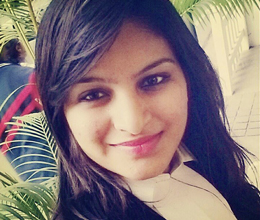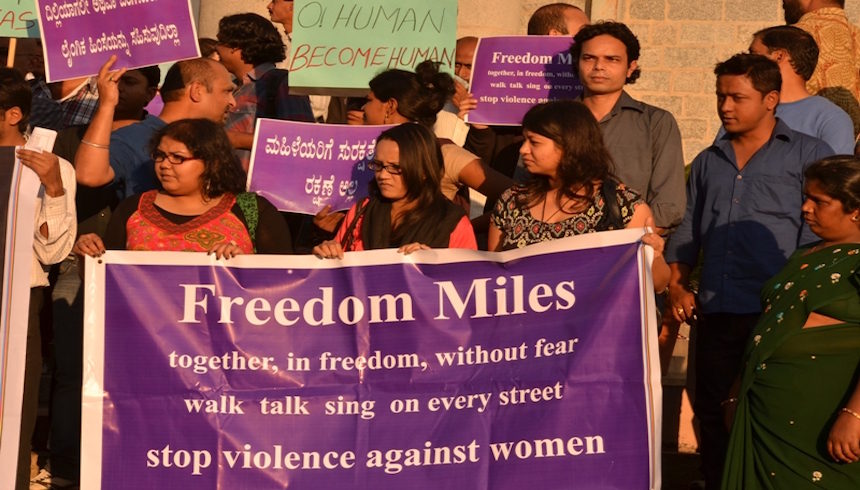Marital Rape:
‘Laws on marital rape cannot be “suitably applied in the Indian context due to various factors like level of education/illiteracy, poverty, myriad social customs and values, religious beliefs, mindset of the society to treat the marriage as a sacrament, etc.”
Remember when Women and Child Development Minister, Maneka Gandhi had written this to the Rajya Sabha when asked about plans to criminalise marital rape? She had then faced the wrath of many human rights activists. You can read more on this here. Well! Good news is that she has now taken a U-Turn. On 19th April, she attended the launch of Beti Bachao Beti Padhao Andolan in 61 additional districts. When asked about marital rape by the media, she said, ‘Centre is now making an attempt to criminalise marital rape.’
Marital rape is non-consensual sex where the perpetrator is the victim’s spouse. Typically, this should be considered as one of the gravest forms of crime as the victim is mistreated by one’s own spouse. She is married to an abuser who can take advantage of the relationship and commit repeated sexual abuse against her.
Yet, successive governments have been indifferent towards marital rape and the need to criminalise it. Justice J.S Verma Committee set up in the aftermath of Delhi Gang Rape Case, 2012, emphasized on the the need to criminalise marital rape. The Committee specified three points:
(a) That marriage or relationship between the accused and the victim cannot be used as a defence to the crime of rape or sexual violation.
(b) The relationship between the accused and victim is not relevant in an inquiry into whether the victim consented to the sexual activity.
(c) The marriage or relationship cannot be a factor that justifies mitigated sentences for the offense of rape.
Yet, India turned a blind eye towards the evil of marital rape.
The Law on Marital Rape at Present:
Section 375 of the Indian Penal Code 1860, penalises a person for rape when he has sexual intercourse with a woman under 16 years of age, with or without her consent. However, sexual intercourse by a man with his own wife is not rape unless the wife is under 15 years of age.
Under the Prohibition of Child Marriage Act 2006, the legal age to marry for a boy is 21 years and for a girl, it is 18 years. Every child marriage, whether solemnized before or after the commencement of this Act, is voidable at the option of the contracting party.
Yet, if a girl marries before attaining the age of 18 years and is sexually abused by her husband, then it is not considered to be rape as she is not under 15 years of age.
As absurd as it sounds, this is the law at present in our country and it is a shame that no one has recognised the evils of marital rape for so long. Also, notice how the age of minors changes in each piece of legislation making the laws inconsistent with each other.
Pam Rajput Committee’s Report on Marital Rape:
The Centre appointed Pam Rajput Committee in its report named ‘Status of Women in India,’ has come down heavily on the legislature for failing to recognize marital rape as an offense. It also criticized the Criminal Law (Amendment) Act, 2013 for ignoring J.S.Verma Committee’s Report on considering marital rape as an offense irrespective of the age of the woman. Even though the report is not public yet, this Article should help.
The founder Director of the Centre for Women’s Studies, Panjab University who is also the chairperson of Pam Rajput Committee, stated that, ‘Marriage is sacrosanct but that does not give anyone the right to abuse the body and dignity of women. It is in this context that we asked that marital rape be criminalised.’
Protection of Children from Sexual Offences (POCSO) Act, 2012 on Marital Rape:
If there is one Act that recognises marital rape (at least till the age of 18 years), it is POCSO Act. One of the grounds for aggravated penetrative sexual assault under Section 5(n) of POCSO is:
(n) whoever being a relative of the child through blood or adoption or marriage or guardianship or in foster or having a domestic relationship with a parent of the child or who is living in the same or shared household with the child, commits penetrative sexual assault on such child;
Therefore, POCSO penalises sexual intercourse with a person under 18 years of age irrespective of their gender, age, marital status or even consent. There is no exception unlike Section 375 of IPC. Section 42A of POCSO also gives it an overriding effect over any other law.
Criticism Against POCSO:
As POSCO does not recognise consensual sex with a person below 18 years of age. Many experts have criticized this new age of consent as too high. It is in total disregard to the social reality as the law intends to assume that all adolescents in the country are sexually inactive and in any case of an adolescent sexual activity, the law would disregard the consent given by an individual.
This would lead to draconian and regressive effects. Moreover, the Act states that where the victim is below the age of 16, then it would be presumed that the accused has committed the offence.
Case Laws under POCSO:
(i) In State v. Suman Dass, a 15-year-old girl eloped and married a 22-year-old man. Her mother filed a case of kidnap and sexual assault against the man. The girl admitted in the court that she had willingly gone with him and had sexual intercourse. In such a case, under POCSO, the man would be held guilty, as it does not recognise consensual sex with anyone below the age of 18 years.
However, the judge held that strict interpretation of the provisions of POCSO would mean that ‘an individual below 18 years of age has no choice over his/her body and cannot be allowed to have pleasures associated with one’s body.’ Hence, the man was acquitted.
(ii) In State v. Aas Mohammad, a pregnant girl aged 14 years admitted before the court that the only reason she and her mother filed a case against the man she had sexual intercourse is because he refused to marry her. The man was acquitted when he offered to marry her and provide shelter to her mother.
Criminalising Marital Rape Suits in All Contexts, Whether Indian or Not:
The present legislations in India have contrasting provisions on marital rape. This paves way for the judges to interpret the laws in the way, they deem fit. Due to which, there has been disparity in the observations made by each judge.
From the hearing held before the special courts under POCSO, it seems that marriage is being implicitly held as a reason to acquit the perpetrator. It also takes away an individual’s autonomy over his/her body if they are below 18 years old.
A study conducted by International Centre for Women and United Nations Population Fund reveals that vast majority of sexual violence faced by women was within marriage itself. Only 2.3% of the rape cases were committed by other men. This study should have been more than enough to meet the government’s requirement of data showing enough number of marital rape cases in India. It should be noted that the survey was only conducted in a few states, the number would have significantly gone up had it covered all states.
Therefore, it is high time that India enacts a law that specifically covers marital rape as an offense, that subjects an individual to repeated abuse at the hands of their spouses. Marriage does not mean to forego one’s dignity. No one should be exposed to sexual intercourse without their consent.
Picture Courtesy: Wikimedia








There Are 8 Comments